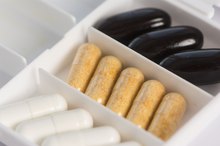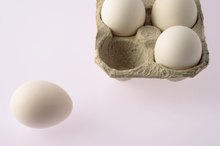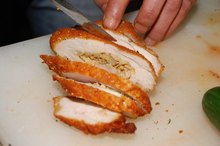Can You Get Bigger by Eating a High-Protein Diet & Not Working Out?
Protein foods are a must for anyone trying to put on muscle weight. Chowing down on chicken breasts and whey protein without exercise will not make you a lean, muscular mom, though. The amino acids in protein support muscle repair and recovery, so your muscles have the capacity to grow and strengthen. Protein foods do not actually increase the size and thickness of muscle fibers, which is what makes you bigger.
Fat Gain
You can get big by eating a lot of protein and not working out, but you’ll be putting on fat -- and what mom needs more of that? Your body can only use so much protein daily to help with tissue growth and repair. If you are not working out, you need just about 0.36 grams per pound of body weight daily -- or about 47 grams daily for a 130-pound person. Your body takes excess protein that you consume and either excretes it through the urine or, if the calories exceed your daily needs, stores it as fat. Eating too much protein, just like eating too much carbohydrate or fat, leads to weight gain.
- You can get big by eating a lot of protein and not working out, but you’ll be putting on fat -- and what mom needs more of that?
- Your body takes excess protein that you consume and either excretes it through the urine or, if the calories exceed your daily needs, stores it as fat.
How Muscles Grow
How to Use Whey Protein Pills
Learn More
Muscles grow bigger in response to stress. Lifting weights breaks down muscle fibers that then grow back stronger and larger. When you consume high-quality protein that contain all the essential amino acids that your body cannot produce, these amino acids help increase this process of muscle synthesis at a greater rate than if you exercised only, notes a 2012 paper published in the "International Journal of Sports Nutrition."
Exercise Requirements
If you want to get big to compete in bodybuilding or figure competitions, or perhaps you just want to put some healthy muscle on a slight frame, exercise is key. Lift heavy weights for three to six sets of eight to 12 repetitions, resting 30 to 60 seconds between sets. Heavy weights equal to about 80 or 85 percent of the most weight you can lift for just one repetition are the weights that will help you build size -- not the pink weights your 5-year-old can heave. Elect to do mostly compound exercises to stimulate the most muscle fibers. These include bench presses, squats, lunges, rows and shoulder presses.
- If you want to get big to compete in bodybuilding or figure competitions, or perhaps you just want to put some healthy muscle on a slight frame, exercise is key.
- Heavy weights equal to about 80 or 85 percent of the most weight you can lift for just one repetition are the weights that will help you build size -- not the pink weights your 5-year-old can heave.
Protein Intake
Protein Vs. No Protein for a Workout
Learn More
The International Society of Sports Medicine recommends that strength-training athletes, whose goal is often to get big and more powerful, exceed the standard recommendation for protein of 0.36 grams per pound of body weight daily. When you want to build muscle, you’ll aim for an intake equal to about 0.9 grams per pound daily. If you weigh 130 pounds, that equals 117 grams per day. Instead of ingesting all that in one sitting, space your protein intake out over the course of all your meals during the day. For the best muscle growth results, a study in a 2012 issue of "Nutrition and Metabolism" suggests that you consume 20 grams immediately after your workout and then every three hours after that for the next 12 hours. One of the best options to support muscle growth after a workout is whey protein because it is easily digested and contains optimal amounts of leucine, an amino acid that promotes protein synthesis.
- The International Society of Sports Medicine recommends that strength-training athletes, whose goal is often to get big and more powerful, exceed the standard recommendation for protein of 0.36 grams per pound of body weight daily.
Related Articles
References
- International Journal of Sports Nutrition: Protein Timing and Its Effects on Muscular Hypertrophy and Strength in Individuals Engaged in Weight-Training
- Journal of the International Society of Sports Nutrition: Protein Stand
- Nutrition and Metabolism: Nutritional Regulation of Muscle Protein Synthesis with Resistance Exercise: Strategies to Enhance Anabolism
- None
- None
- None
- None
- None
- None
- None
- None
- None
- None
- None
- None
- None
- None
- None
- None
- None
- None
- None
- None
- None
- None
- None
- None
- None
- None
- None
- None
- None
- None
Writer Bio
Andrea Cespedes is a professionally trained chef who has focused studies in nutrition. With more than 20 years of experience in the fitness industry, she coaches cycling and running and teaches Pilates and yoga. She is an American Council on Exercise-certified personal trainer, RYT-200 and has degrees from Princeton and Columbia University.









